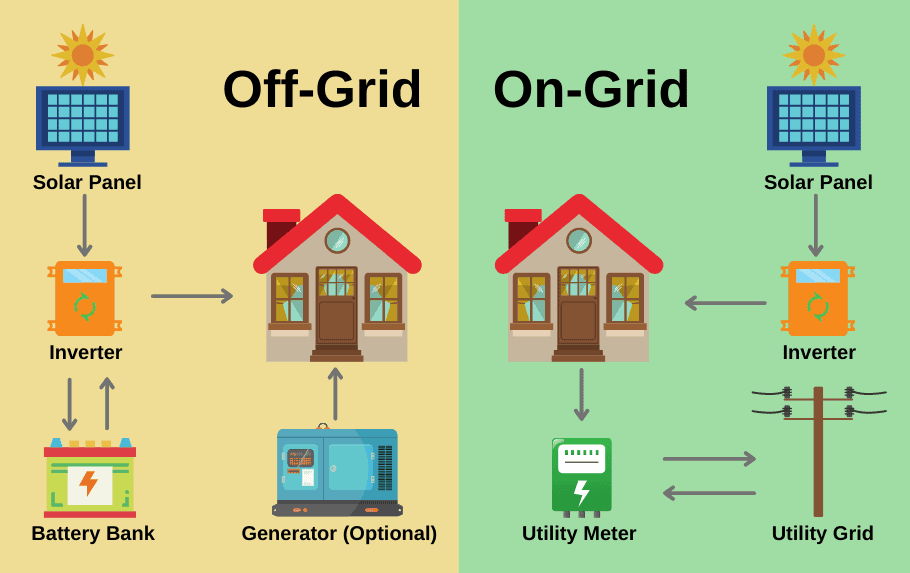Solar power is quickly rising to become one of the most dominant sources of renewable energy since solar power capacity has increased 11 folds in the last five years. Whereas, in March 2014 the total capacity was 2.6 GW, it went on to 30 GW by July 2019. The government is not only investing in solar power but also aggressively encouraging citizens to make it a part of their lives in order to meet the climate goals and reduce the country’s overall carbon footprint on the global stage.
As a consumer, you can be a part of this revolution to make the planet much greener and more breathable by helping eliminate our innate need for energy generated using fossil fuel. Depending on where you live, you can choose between one of two options.
- off-grid solar power system
- on-grid solar power systems
Let’s have a look at both the systems, their benefits and other details to help you decide which one would be most suited to your unique requirements.
Off-grid solar power system
Off-grid solar power systems are powerful systems designed to offer access to constant electricity in areas where the erratic nature of power makes it difficult for people to live comfortably. The off-grid system is a combination of PV panels, inverters, controllers, and batteries that work together to generate its own electricity during the day and divert excess power to the batteries for usage during the night.
Thus, making the system completely self-sustainable without any form of reliance to the public grid. They are durable and can easily last for up to 25 years once set up. Moreover, you no longer need to pay utility bills with an off-grid power supply as you generate your own power. So, if you live in an area where the electricity infrastructure is not up to the mark, then an off-grid solar power system is the best option for you.
On-Grid Power System
An on-grid solar power system does not require a battery since it is connected to the grid. Similar to the off-grid system, it generates electricity, but it may or may not generate all of the required power and is therefore, dependent on the main public grid to compensate for any lack of power.
It’s less expensive to set up compared to an off-grid power system and the electricity and you can save a lot of money by diverting any excess power back to main grid to get credits which can be redeemed in utility bills. This is a great option for people who have access to the main public grid; however, they are looking at savings in utility bills. Even if you don’t generate excess power, you will still save a lot of money due to less reliance on the main grid for your power requirement.
Both the off-grid and on-grid solar power systems are great options; it’s only that they differ in their approach. One is self-sufficient, and the other partially relies on the main public grid to compensate for any lack of power. However, both offer almost the same benefits:
- Huge savings on electricity bills
- Lowers your carbon footprint
- Get credits and subsidies from the government for contributing to the main grid
- One-time investment that keeps paying for itself for up to 25 years
- Durable, cost-effective, low on maintenance
If you are thinking of switching to a solar power system, Luminous has the most comprehensive portfolio of solar-based power systems in the industry. Their products are renowned for offering one of the best service lives in the industry and a low cost of ownership that gives them extreme value for money. So, if you are looking for a robust, durable, and high-quality, cost-effective solution, then do check out their entire catalogue of solar products today.







